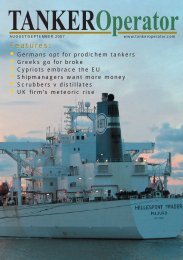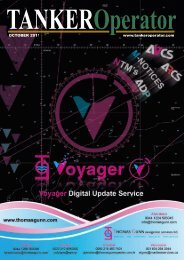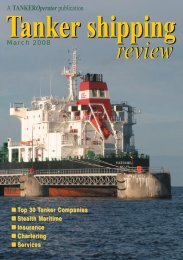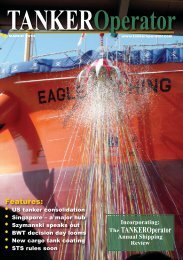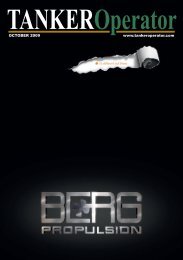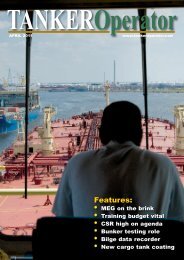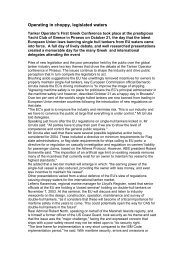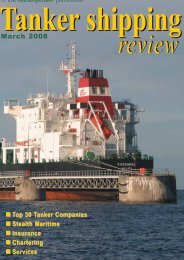Navigation standards slammed - Tanker Operator
Navigation standards slammed - Tanker Operator
Navigation standards slammed - Tanker Operator
Create successful ePaper yourself
Turn your PDF publications into a flip-book with our unique Google optimized e-Paper software.
p30-34.qxd 09/05/2006 12:00 Page 2<br />
level of the emission reduction through<br />
this route.<br />
• Consider reducing NOx and PM emission<br />
limits for existing engines.<br />
• Consider whether Annex VI emission<br />
reductions or limitations should be<br />
extended to include diesel engines<br />
that use alternative fuels and engine<br />
systems/power plants other than diesel<br />
engines.<br />
• Review the texts of Annex VI,<br />
NOx technical code and related<br />
guidelines and recommend necessary<br />
amendments.<br />
By December 2007, the Baltic, North Sea<br />
and English Channel will all be designated<br />
as less than 1.5% sulphur fuel regions,<br />
while just over two years later fuel oil<br />
of 0.1%, or less will be mandatory in all<br />
EU ports.<br />
Currently low sulphur residual fuels<br />
are available in a limited number of ports<br />
around the world, pointing to an<br />
increased need for customers to work<br />
closely with luboil suppliers to guarantee<br />
availability, BP Marine claimed. The use of<br />
abatement technology as another option<br />
for reducing sulphur emissions has<br />
attracted widespread interest.<br />
Lubricant availability was also a key<br />
area. BP Marine gave reassurances over<br />
its continued ability to supply product,<br />
despite ongoing difficulties for raw<br />
material suppliers. Procurement cost of<br />
lubricants also ranked highly on the list<br />
of issues, particularly in light of falling<br />
MEPC 54 outcome<br />
At its 54th session in March 2006, a working<br />
group was established to consider<br />
issues relating to the prevention of air pollution<br />
from ships, including follow-up<br />
action to the IMO Policies and practices<br />
related to the reduction of greenhouse gas<br />
emissions from ships (resolution<br />
A.963(23)).<br />
Following discussions, the MEPC<br />
approved two circulars aimed at assisting<br />
implementation of MARPOL Annex VI:<br />
1) The MEPC Circular on bunker delivery<br />
note and fuel oil sampling,<br />
to clarify how to comply with regulation<br />
18, which places requirements on<br />
shipowners and fuel oil suppliers in<br />
respect of bunker delivery notes and representative<br />
samples of the fuel oil received<br />
and on parties to the 1997 Protocol to regulate<br />
the bunker suppliers in their ports.<br />
The circular urges all member states, both<br />
parties and non-parties to the 1997<br />
Protocol, to require fuel oil suppliers in<br />
their ports to comply with the requirements<br />
and to raise awareness of the necessity<br />
to enhance implementation and<br />
enforcement of regulation 18 of Annex VI.<br />
2) The MEPC circular on notification<br />
to the IMO on ports or terminals where<br />
volatile organic compounds (VOCs)<br />
emissions are to be regulated, which<br />
notes that regulation 15 of Annex VI<br />
requires parties to inform the organisation<br />
of their intention to introduce<br />
requirements for the use of vapour emission<br />
control systems and to notify the<br />
IMO of ports and terminals under their<br />
jurisdiction where such requirements are<br />
already in force. However, many terminals<br />
are implementing or operating such<br />
practices without notification to the<br />
organisation. The committee were concerned<br />
that, since there is no circulation<br />
of such information, it is difficult for<br />
owners and operators to prepare for<br />
these changes at ports and terminals.<br />
The circular reiterates that parties to the<br />
1997 Protocol are required to notify the<br />
IMO without delay with information on<br />
ports and terminals under their jurisdiction<br />
at which VOC emissions are or will be<br />
regulated, and on requirements imposed<br />
on ships calling at these ports and terminals.<br />
Any information received by the<br />
IMO on the availability of vapour emission<br />
control systems will be circulated<br />
through MEPC circulars so that owners<br />
and operators will have up to-date information<br />
on current and future requirements<br />
for the utilisation of such systems.<br />
The committee and its working group<br />
on air pollution had long and extensive<br />
debates on how to follow up resolution<br />
A.963(23) on IMO policies and practices<br />
related to the reduction of greenhouse gas<br />
(GHG) emissions from ships. By the resolution,<br />
the assembly urged MEPC to identify<br />
and develop the necessary mechanisms<br />
needed to achieve the limitation or<br />
reduction of GHG emissions from international<br />
shipping.<br />
The MEPC agreed to consider the follow-up<br />
actions to resolution A.963(23) in a<br />
technical and methodological perspective<br />
and to concentrate the work on CO2 emissions.<br />
The committee also agreed to continue<br />
the work at the next session and, in<br />
particular, to consider further a draft work<br />
plan to identify and develop the mechanisms<br />
needed to achieve the goal set by<br />
the assembly.<br />
Reservations<br />
Meanwhile, in an important submission<br />
to the IMO, the round table of international<br />
shipping associations (BIMCO,<br />
BP Marine commits to<br />
low sulphur fuels<br />
shipping rates.<br />
Jill Nguyen, managing director of<br />
BP Marine Lubricants, said: "Divestment<br />
by refineries away from Group 1 base<br />
oil capacity is now a primary concern<br />
affecting the price and availability of<br />
marine lubricants. The cost of Group<br />
1 base oils rose by 65% in 2005, while hurricanes,<br />
fires and unplanned incidents led<br />
to a major dip in supply. Despite this, BP<br />
Marine is confident of its ability to supply<br />
existing customers thanks to strategic<br />
partnerships with its suppliers."<br />
A key question was whether the use of<br />
low sulphur fuel oil necessitated specialist<br />
lubricants. Both BP Marine and engine<br />
manufacturer MAN B&W had issued reassuring<br />
statements that low sulphur fuels<br />
are likely to be supplied with a sulphur<br />
content close to 1.5% and that the lubricant<br />
type and engine design do not need to be<br />
changed.<br />
TO<br />
Intercargo, International Chamber of<br />
Shipping (ICS) and Intertanko, plus<br />
the International Council of Cruise<br />
Lines (ICCL)) conveyed its strong commitment<br />
to the revision of atmospheric<br />
pollution <strong>standards</strong> contained in<br />
Annex VI.<br />
The industry expressed its support,<br />
in principle, for the consideration of<br />
proposals by Norway to address the<br />
sulphur content of marine fuel used<br />
globally and in SECAs. The industry said<br />
that it kept an open mind to discuss possible<br />
additional measures to introduce<br />
more stringent global controls on NOx<br />
emissions by ships and on the need to<br />
address emissions of particulate matter.<br />
However, its overall support is conditional<br />
upon IMO adhering to certain<br />
principles as it begins the complex task<br />
of bringing about further improvements<br />
to shipping's environmental performance,<br />
following the entry into force of the<br />
Annex in May 2005.<br />
The shipping industry said in a joint<br />
statement that it has actively encouraged<br />
the early ratification by governments of<br />
the Annex in the knowledge that it would<br />
be re-opened for amendment, due to the<br />
improving air pollution record of shore<br />
based transport and the perception, correct<br />
or otherwise, that shipping was<br />
falling behind. The IMO review could<br />
have a major impact on safety of operations,<br />
fuel costs, engine design, and even<br />
TANKER<br />
<strong>Operator</strong><br />
the long term commercial viability of<br />
many ships.<br />
As the IMO review progresses, any<br />
new requirements must be justified<br />
through scientific study of environmental<br />
need and operational safety procedures,<br />
the round table said. In co-operation<br />
with oil suppliers, IMO must also<br />
satisfy itself that any new fuels required<br />
will be available globally, and that any<br />
solutions adopted use technology that<br />
has actually been developed, tested and<br />
proven to be reliable to an extent that<br />
ship crews are not left with unsafe new<br />
technologies.<br />
The industry said that it does not<br />
want to see a repetition of the situation<br />
that emerged with controls on ballast<br />
water where regulations have been<br />
adopted for political reasons before the<br />
new methods required by the rules are<br />
actually proven.<br />
Where the environmental need is justified,<br />
and despite the potential economic<br />
costs, the industry said it was willing to<br />
consider proposals that could require<br />
existing ships to make modifications to<br />
their propulsion systems. However,<br />
shipowners would need a clear long term<br />
framework for change that takes full<br />
account of the current life expectancy of<br />
ships. If there are significant limitations to<br />
what can be realistically achieved then<br />
'grandfathering' arrangements may need<br />
to be sought in some areas.<br />
TO<br />
<strong>Tanker</strong><strong>Operator</strong> May/June 2006 page 31



